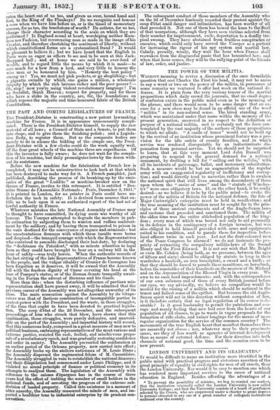THE POWER OF THE MILITIA.
WiTriorrr meaning to revive a discussion of the once formidable question that cost Charles the First his head, it may not be amiss to say a word or two on the power of the militia, in pursuance of some remarks we ventured to offer last week on the national de- fences. It is plain from the very various tenour of the martial propositions which daily crowd the journals, that no small degree of confusion exists in the public mind even as to the meaning of the phrase, and there would seem to be some danger that an ex- cuse for a new sham may be found in an official use of the word " militia " in its non-natural sense. The hired standing army, which was maintained under that name within the memory of the present generation answered in no respect to the definition or purpose of a national militia, and is certainly not the force con- templated by the vast majority of the authors of those propositions to which we allude. "A castle of bones" would not be 'built up by the revival of an institution whose prominent feature was a pro- vision for the idle cadets of county families, and in which service was rendered disreputable by an indiscriminate dis- pensation from personal service. Yet we should not be Surprised to learn, that at this very moment Lord John Russell was preparing to respond to the general demand for a national armament, by drafting a bill for "calling out the militia," with all its incidents of patronage, ballot, and mercenary substitution. Such a measure would be but an augmentation of the regular army with an exaggerated regularity of inefficiency and corrup- tion; and would directly tend to narcotize rather than to awaken the national spirit that still lives among the descendants of those upon whom the "assize of arms" and the "statute of 'Winches- ter" were once obligatory laws. If, on the other hand, it be really desired—as we believe it to be by the public mind--to evoke the power of the militia of Britain for the national defence, the fate of Major Cartwright's enterprise must be held in recollection ; and the true meaning of the institution must be sought for in the prin- ciples of those ancient enactments and of the Anglo-Sax-on laws and customs that preceded and sanctioned them. The militia of the olden time was the entire ablebodied population of the king- dom; every man of which was bound not only to aid personally in its defence in the contingency of a foreign invasion, but was also obliged to hold himself provided with arms and equipments suited to his condition, and to parade these for inspection before local officers twice in each year. Let not the drab-coloured men of the Peace Congress be alarmed! we do not insinuate the pro- priety of reenacting the compulsory militia-laws of the Second Henry and the First Edward. It is not our wish that Mr. Bright or even Mr. Cobden (being both, as we presume, between the ages of fifteen and sixty) should be obliged by statute to keep in their wardrobes a hauberk, an iron breastplate, a sword and a knife • or that they should be forced to parade these munitions, on horseback, before the constables of their hundreds on the morrow of St. Michael and on the Annunciation of the Blessed Virgin in every year. We own to no such hard impeachments; and, with the correspondence of our own columns and of those of every British journal before our eyes, we say advisedly, we believe no compulsion would be needed for the raising of a militia which should be national in the truest and fullest sense of the epithet. But because the old Anglo- Saxon spirit will act in this direction without compulsion of law, is it therefore certain that no legal regulation of its course is de- sirable P Is it good husbandry to permit the patriotism and cou- rage and manly feeling that now boil over from the hearts of our population of all classes, to.go to waste in vague proposals for the formation of rifle clubs, and vainer longings for the means of more regular organization for the service of the common country P The movements of the true English heart that manifest themselves thus are assuredly not shams ; nor, whatever may be their proximate cause, are they of less worth as agencies of internal development than as means of external defence. For their direction into both channels of national good, the time and the occasion seem to be now present.


























 Previous page
Previous page